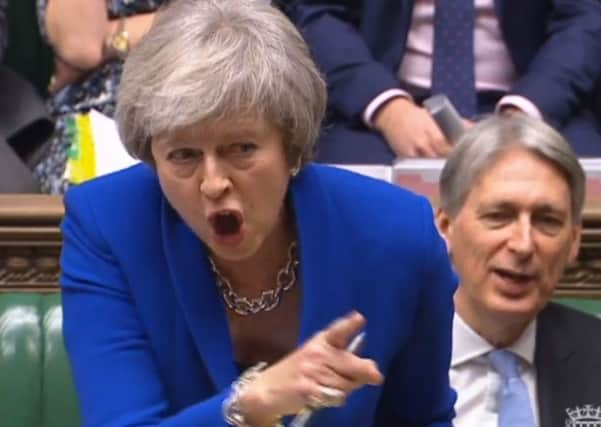These two simple questions in a second referendum could solve Brexit mess


The public might lose faith in politicians, she said. They had trusted democracy to engineer a clean break with Europe and would now be sent a message that it had not delivered.
But she knew very well that she was attempting to lock the door of a stable whose horse had not only bolted but was already half way round the track at Doncaster.
Advertisement
Hide AdAdvertisement
Hide AdWorrying that a second ballot would undermine Westminster’s otherwise unblemished credibility is like Network Rail obsessing over a puddle on the platform at Pudsey.
So on the eve of Parliament’s reopening for what passes these days for business as usual, it is worth asking if another referendum is really the threat to democracy that the PM fears, or whether it might – given the right questions on the ballot paper – actually do it some good.
The pressure to put the issue back in the hands of voters is intensifying on both sides of the House. A survey among more than 1,000 Labour members this week found that nearly three-quarters wanted Jeremy Corbyn to throw his weight behind a so-called people’s vote.
In the Tory ranks, the former Home Secretary, Amber Rudd, was said by some of her colleagues to be “brave and principled” for having acknowledged before the recess that she could see the argument for another vote if Parliament failed to agree on the deal now before it.
Advertisement
Hide AdAdvertisement
Hide AdIf stating the obvious is now considered brave, let’s by all means give Ms Rudd a medal of valour. But the reality is that the hypothetical nature of the 2016 poll, before a single option had been placed on the table, meant that none of us knew the consequences of what we were voting for. A say on the choices now available would clarify, not invalidate, the original mandate.
Nor should a safety check be unexpected. We’re used to pressing a second button whenever we try to do something as simple as deleting a computer document or removing a programme from the Freeview box.
Is it really too much to be asked, ‘Are you sure you really meant to leave the European Union?’ on something as important to future generations as this?
Besides, the new questions can be constructed in such a way as to take the debate forwards, not back.
Advertisement
Hide AdAdvertisement
Hide AdI have taken the liberty of writing a first draft. There are just two questions, and only two possible answers for each. First, should we proceed with the Brexit deal negotiated by the Prime Minister? If not, should we leave Europe without a deal, or remain in the EU?
We can argue about it from now until the trains finally run on time – and we doubtless will – but the alternatives are only ever going to come down to those three.
I don’t believe the result of a second poll will fundamentally change the 2016 decision, but that’s not the point. It will give those who were misled by the promises of the Leave campaign to pump an extra £350m a week into the NHS a chance to adjust their maths, and the rest of us the opportunity to express a view on what Brexit actually means, not just on how it was imagined.
And what harm can it do the Prime Minister now? She has already decided not to lead the Conservatives into the next election; her only role, she says, to deliver what the electorate wanted.
Advertisement
Hide AdAdvertisement
Hide AdIn many ways, she has done that already – the evidence is the 585-page Brexit draft on her desk. I don’t think she is so insecure as to feel undermined by giving the rest of us a say on what it looks like.
Nor would she be overturning democracy by disregarding the original vote, or dismissing the views of the previously silent but sizeable group of voters who felt unrepresented by a political debate that had left them on the sidelines. She would simply be saying, in the language of those infernal computers, ‘This will be the effect of what you have decided. Click to confirm’.
This is not brave and principled, but sober and rational. Politicians got us into this mess; here is the chance, one way or another, for the rest of us to get us out of it.